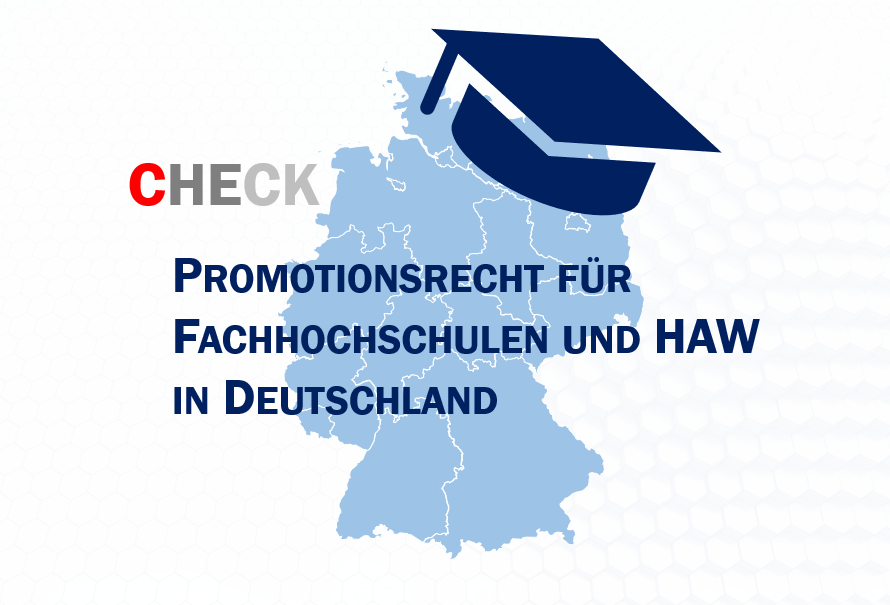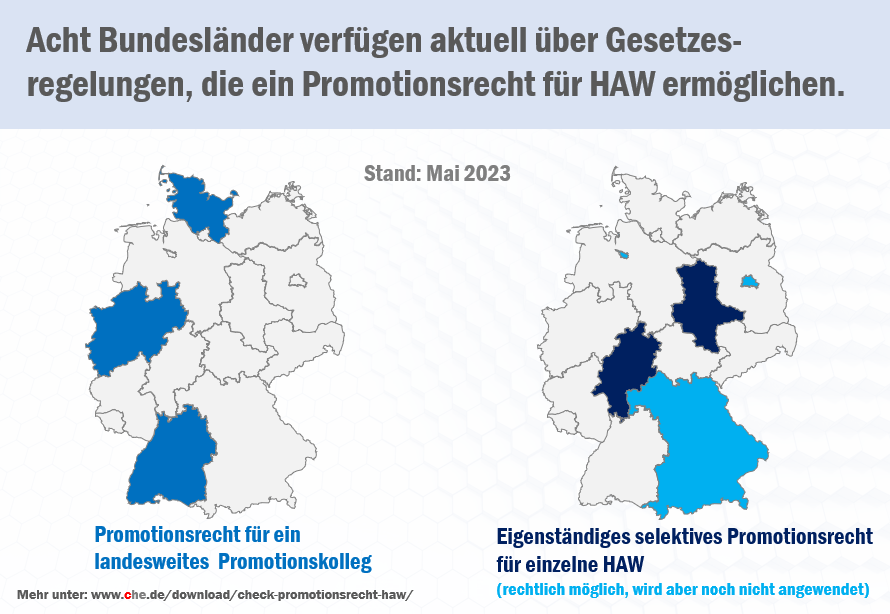
Only around one per cent of all people in Germany currently working on a doctorate do so with the involvement or leadership of a university of applied sciences, or UAS for short. A growing number of federal states, however, have meanwhile created new rules giving universities of applied sciences the right to award doctorates themselves, as an overview by the CHE Centre for Higher Education shows.
Universities of applied sciences, or UAS for short, are becoming increasingly popular among students. Whereas in 1980 around a quarter of first-year students in Germany chose to study at a UAS, by 2022 this figure had risen to just under half. This is due in part to the increasingly popular combination of practical and academic work. Moreover, the aspects of research and knowledge transfer also play an ever-important role at universities of applied sciences.
It was long the case that UAS graduates wanting to pursue a doctorate had no choice but to switch to a university. Meanwhile, however, several federal states have also introduced PhD schemes that no longer require cooperation between a UAS and a university, as highlighted by a recent CHECK on the topic conducted by CHE.
Four scenarios currently exist in Germany:
- UAS graduates pursue a doctorate by switching from a UAS to a university.
- UAS graduates pursue a cooperative doctorate at a university, but are supervised and examined there by professors from the two cooperating higher education institutions (HEIs).
- UAS graduates pursue a doctorate in a doctoral college, i.e. an overarching alliance of the state-run universities of applied sciences in a particular federal state.
- UAS graduates pursue a doctorate at their own UAS or in cooperation with several universities of applied sciences in the form of a doctoral centre focused on a particular subject or domain.


Eight federal states – Schleswig-Holstein, Bremen, Berlin, Saxony-Anhalt, North Rhine-Westphalia, Hesse, Baden-Württemberg and Bavaria – currently have legislation in place that allows universities of applied sciences to award doctorates. North Rhine-Westphalia, Baden-Württemberg and Schleswig-Holstein have opted for the doctoral college approach. A selective right to award doctorates independently is now practised in Hesse and Saxony-Anhalt. It is also legally possible in Bavaria, Berlin and Bremen, but the right is not yet practised in these federal states.
“In the long run, no federal state will be able to afford to deny its universities of applied sciences the right to supervise doctorates themselves; this trend cannot be stopped,” Ulrich Müller predicts. The previous options for cooperation between universities and UASs exist on paper, and no doubt function very well in isolated cases. In reality, however, the figures show that UAS graduates struggle to find university professors who are willing to cooperate. You would need a stadium to fit all conventional doctoral students from Berlin and North Rhine-Westphalia – but a bus would suffice for their counterparts doing a doctorate within a university/UAS cooperation in these two states,” stated the Head of Policy Studies at the CHE Centre for Higher Education, giving a clear illustration of the situation. According to the Federal Statistical Office, around 2,400 of the 200,000 people nationwide who were working on a doctorate at a German university in 2021 did so with the involvement or leadership of a UAS.
However, it would not be a desirable objective to grant all universities of applied sciences a blanket right to award doctorates, according to the authors of the “CHECK – Promotionsrecht für Fachhochschulen und HAW in Deutschland” (CHECK – the right for universities of applied sciences in Germany to award doctorates). The selective right to award doctorates at the level of research-intensive departments or inter-university doctoral colleges or centres, which has already been implemented in some variants, is considered the right approach. This is because it imposes strict and high quality requirements, ensuring not only quality assurance, but also the acceptance of UAS doctorates.
In the current consolidation phase of the new schemes, it is important for UASs to further emancipate themselves from universities. Moving away from university doctoral procedures to create approaches where UASs can award doctorates themselves was the first necessary step in the right direction. Now universities of applied sciences should not make the mistake of imitating universities one-to-one. Instead, UASs should be bold enough to incorporate the strengths of their HEI type into their doctoral projects, focusing on practical relevance and solution orientation,” remarked Müller.
About the publication:
The “CHECK Promotionsrecht für Fachhochschulen und HAW in Deutschland” (CHECK – the right for universities of applied sciences in Germany to award doctorates) provides a quick visual overview of the doctoral schemes for and involving UASs in the 16 federal states. The publication is based, among other things, on an analysis of the relevant federal state higher education acts and of data from the Federal Statistical Office. The CHECK was written by Ulrich Müller and Isabel Roessler. All the publication’s graphics are available on the CHE Flickr channel.
